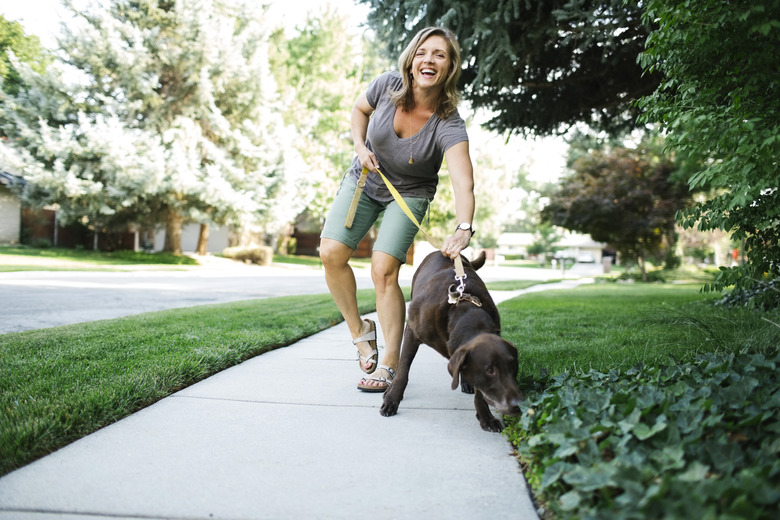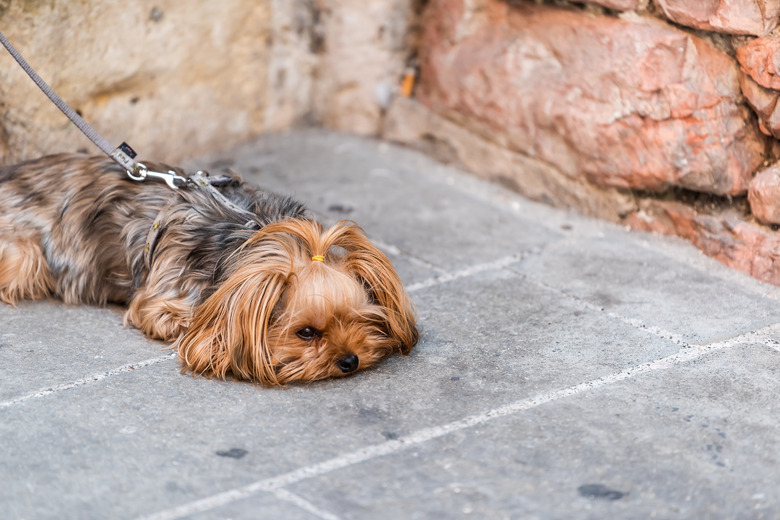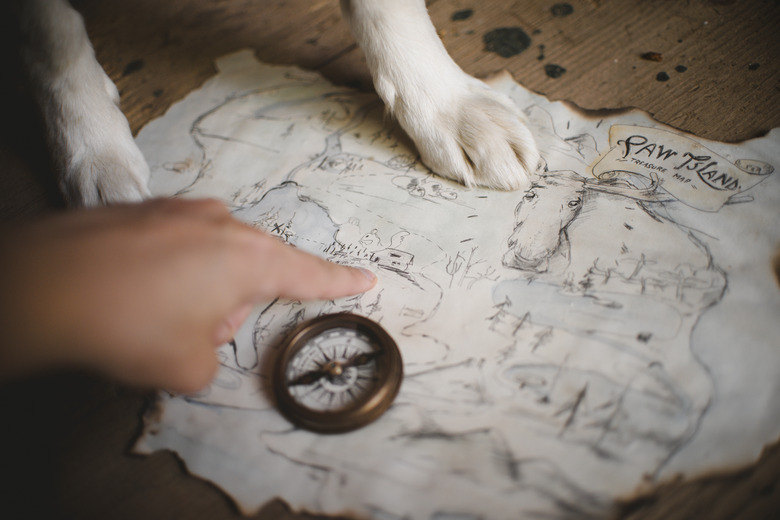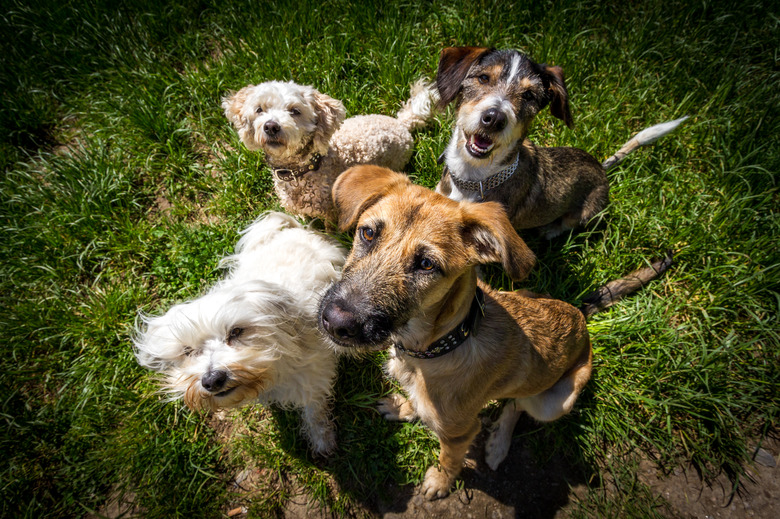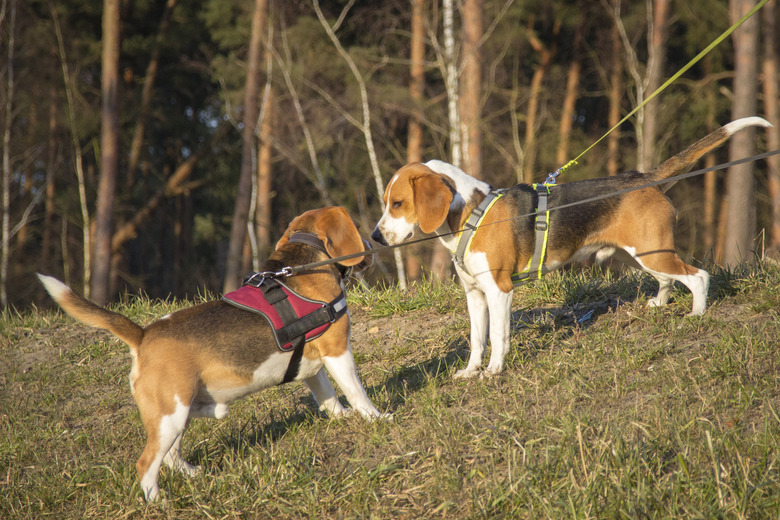Why Does My Dog Take So Long To Poop On Walks?
Walking your dog can be a project in multitasking. On a walk, a dog can get exercise (which is vital to both their physical and mental health), take in some stimulating smells, and, of course, use the bathroom. But sometimes, you don't always want a single walk to serve multiple functions. Sometimes, you're in a hurry and you just really, really need to get your dog to go potty so you can get going yourself. Or maybe you weren't in a hurry when the walk started, but Fido's quest for the perfect spot goes on so long that you're somehow running late by the end of it.
If you've ever wondered why it can take your dog forever to go poop on a walk, you're not alone. It's a problem almost every dog owner has faced at one time or another—and, as annoying as it can be, there are reasons that help explain this frustrating phenomenon. Here are all of the things that can contribute to dogs taking their sweet, sweet time to go poop on walks.
The time of day
The time of day
Just like humans, dogs can have very regular or very irregular bowel movements. There's no one schedule or frequency or volume of poop that acts as the official standard for "normal" when it comes to dogs, but if you're walking your dog during a time when their digestive system isn't ready to move (like immediately after your dog wakes up), you could be setting yourself up for a long walk.
The earth's magnetic fields
The earth's magnetic fields
Another thing that impacts your dog's poop schedule? The earth's magnetic fields. This probably sounds bonkers, but it's backed up by science. According to a study published in Frontiers in Zoology, dogs may prefer to do the deed with their bodies' aligned along the North-South axis. Seriously.
In the study, researchers spent two years observing dogs when they eliminated (for a grand total of 5,582 urinations and 1,893 defecations) and, when controlling for other factors that could have impacted the dogs' behavior, including the time of day, angle of the sun, and wind speed, the scientists concluded that the earth's magnetic fields appear to play a role in deciding both how and where dogs go number two. This could suggest that dogs possess magnetosensitivity, like birds, whales, and bees.
Their social life
For dogs, pooping is a social activity. It doesn't mean that your dog is waiting for another dog to join them physically for a poop sesh (in fact, many dogs prefer a little privacy, since the act of defecating leaves them temporarily vulnerable to attack), but they are definitely interacting with other pups when they leave their mark—be it pee or poop.
Basically, urine and feces are ways for dogs to communicate with each other. Your dog sniffs up a storm before picking a place to go both because he's taking in all of the info other dogs in the neighborhood have left for him and deciding where to leave a message of his own.
"These messages can tell your dog how many other dogs are in the immediate area, the sexual status of those dogs—whether a female is in heat, for example—whether a particular dog is a friend or an enemy, what he or she had for lunch, and when they were last in the area," Carlo Siracusa, director of the Small Animal Behavior Service at the veterinary hospital of the University of Pennsylvania, told Wired.
Dogs are able to learn so much from sniffing the remnants of each other's excrement thanks to their super-powered noses—dogs have 300 million olfactory receptors in their noses that allow them to pick up on the unique combinations of pheromones, ammonia, and gland secretions left behind when other pups relieve themselves.
In the wild, wolves usually create what's known as an "olfactory bowl" by leaving their scent markings (which include everything from feces and urine to paw scratches) around the perimeter of their territory. This serves as a message to other animals that the area is spoken for and they should steer clear. Even in the wild, wolves prefer to poop along trails and roads, and especially at places where these paths cross, because they know these highly-trafficked routes will ensure the widest reach for their message.
For domestic dogs like your furbaby, scent marking still deeply ingrained and that instinct drives dogs to sniff as much as possible to pick the best place to deposit their poo.
Performance anxiety
Performance anxiety
While all dogs are aware of the vulnerability that comes with squatting for a poop, some are more anxious about that vulnerability than others. In this case, a dog taking a long time to poop on a walk might be waiting to feel safe doing the deed. This could mean waiting for the area to be clear of other dogs and people or just waiting for you to look up from your phone and lock eyes with him.
"Your dog is instinctively aware of his defenselessness. But your dog also knows that she is a part of your 'pack.' You are a member of the family group," veterinarian Dr. Kathryn Primm explains. "If your dog watches you during this time, it is because she is depending on you to give her a body language signal or 'heads up' if she should be afraid. She may also be looking to you to possibly defend her should the need arise. If you suddenly leap away, you can bet your dog will respond also."
Purposeful procrastination
Purposeful procrastination
Her's the thing: Dogs are actually really smart. They're definitely smart enough to figure out, for example, that once they go pee and/or poop, their walk time ends and you take them back inside. So, if your dog only goes on walks for potty breaks (which is the case for a lot of dogs who live in apartments and cities), their extended pre-poop time may be a very conscious choice.
If this rings true to you, the best way to shorten the time it takes your dog to go poo on a walk may be to make a point to take him on more frequent and longer walks if possible and, at very least, to make a point to continue walks for a few minutes after your dog goes to the bathroom. This way, they won't associate relieving themselves with ending something they love (a walk with you) and, hopefully, won't feel the need to hold it as long as possible once they get outside.
Personal preferences
Personal preferences
One final reason your dog takes forever to poop on walks? He's just looking for the place he likes best. There are plenty of things that can factor into your dog's pooping place preferences, including how hard or soft the surface of the ground is (most dogs prefer softer surfaces for potty time), if he's used the bathroom there before (most dogs prefer to use a place they've gone before because it smells like them—but only if it's pretty clean, so still make sure you scoop), and their history (dogs develop their potty preferences when they're very young, so adult dogs will likely prefer to go on the surfaces that are most similar to those they used as puppies).
Conclusion
Conclusion
As you may have expected going into this question, there are a lot of factors at play when your dog seems to be taking forever to poop. The good news is, it's totally normal and just a part of them living that #DogLife. If the issue feels like it's really out of hand, of course, you can always work on training your dog to poop in one spot or on command.
